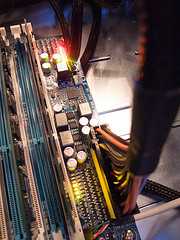
Small Business Server Tips
So you need a server for your small business. Perhaps your business is growing beyond just a few computers on a wireless access point or you’re upgrading from an outdated small business server. In any case, here are seven tips you should consider to help you pick the best small business server for you.
- Make sure you can afford it. Set your budget up front. Server costs can run into the thousands and you don’t want to buy more server than your budget allows. Plan to shop around and take the time to select the best hardware and software within your price range.
- Get a reputable brand. When it comes to server hardware and software there are lots of options to choose from. Some brand names are easily recognizable like Apple, Microsoft, Dell and IBM. But there are lots of other names you may not recognize and they are often much less expensive than competing name brands. Unfortunately, some of those names are known for producing duds. How do you make sure you don’t buy a server component you’ll later regret? Do your research on sites like Amazon 0r CNET. Or better yet, consult an expert who deals with these products all the time.
- Use a server-grade operating system. If you’re going to the effort to buy a server, don’t install an operating system meant for workstations. Server operating systems are specifically designed to handle requests from multiple clients whereas workstation operating systems are meant to be used by one person at a time. Server operating systems are significantly more expensive because of this but you’ll want your server to be able to handle a heavy load when everyone in your small business is hard at work.
- Take space into consideration. Decide where your small business server will be located and how it will be accessed. If you plan to keep it in a closet will it be on a cart or in a rack? Rack-mounted servers need to be actually mounted on a rack versus on a desk or cart for best ventilation. If you plan to have a traditional tower server make sure it is properly located to protect it from people accidentally running into it and powering it off.
- Build in redundancy.For a small business server, “uptime” is critically important. You want your server to be available all the time. That means you’ll want to seriously consider having redundant hard drives in a RAID configuration and if you can afford it, even redundant power supplies and a battery backup unit to prevent data loss from a power outage. Hard drives and power supplies are among the most likely components to fail so having redundancy for them is smart.
- Give yourself room for growth. Even if you can’t afford getting a top-of-the-line server for your business today, you should still get a system that can be expanded in the future. The places you’re most likely to see room for expansion are on the motherboard where you can add more memory and the hard drives where you can add additional storage space. With space to add more memory and hard drives later you won’t be forced to upgrade your whole server when it’s time to expand.
- Enable remote support. Unless you plan to manage your small business server yourself or have someone on your staff do it, you’ll want your server operating system to allow remote access for remote administration. This will give someone you outsource server administration to the ability to manage and maintain your system without having to be physically next to the server. Not all server operating systems are equal when it comes to remote access for administration so make sure you choose the one that will give you the support you need.
While it may seem like there are a lot of things to think about when it comes to picking the best small business server it mostly boils down to doing your research and thinking ahead. You can cut down the research significantly and increase your chances of getting the right server for your business by working with a qualified consultant, of course, and I’m more than happy to do that. 🙂
Please comment with any questions or feedback. I’m always happy to help.
-Brian Burnett, your Seattle IT Consultant.
Photo credit: indigoprime